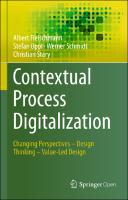Author success story
Context about the author:
Prof Christian Stary holds a PhD (1988) and a Diploma (1984) in usability engineering from the Vienna University of Technology (TU Wien), where he completed his Habilitation (venia docendi) in advanced dialog engineering in 1993. He is currently a full professor in Business Information Systems at the JKU Department of Business Informatics-Communications Engineering. He also chairs the JKU Knowledge Management Competence Center. At JKU he is Chair of ICKM (International Council of Knowledge Management). His research interests are work knowledge elicitation and modelling, learning support and organizational development. He has published around 300 refereed papers in journals, books and archival proceedings since 1984. His latest international and national projects had the focus on design-integrated engineering methods and stakeholder-centred digital twin creation.
His (English-language) OA books are:
- Subject-Oriented Business Process Management (2012)
- S-BPM in the Wild (2015)
- S-BPM in the Production Industry (2017)
- Contextual Process Digitalization (2020)
- “From Digital Twins to Digital Selves and Beyond” (currently in production)
Please provide some background information on the research project, book origin, adjacent research, and/or network enabling the book
We consider understanding behaviour to be crucial for socio-technical system development. For design and use, and increasingly throughout run time, various stakeholders are involved in system development tasks. Their background and expertise form the context that needs to become an active asset of development. Digital models and modelling play a crucial role, but need to be tightly coupled to mental models and human capacity-building, in particular in highly complex and evolving ecosystems, such as CPS. It turns out that a thorough understanding of transformation processes in terms of individual and collective learning experiences increase acceptance and system quality.
What was/were your motivation(s) for wanting to publish this book?
We wanted to address a variety of stakeholders and sectors when sharing our findings, and encourage innovations along transformation processes.
Please give some information on the funding behind the research / book / network
We were able to receive funding from various projects and initiatives. Our academic institutions and our network partners were helpful to that respect.
Was the book made available on your own website, or the website of any other editors or contributors, or your institution? If so, please state which.
No.
Open access success story:
What makes this book successful?
It bridges the gap between human needs, technological potential, and organizational capabilities in digital transformation projects.
Why did you choose to publish this book open access?
We had positive experiences with the publisher, in particular concerning how the book is promoted and how accessible it is.
Do you think that open access publication helped the book and if so, why?
Yes, since various stakeholder groups, including academia and practitioners, gained access.
Did your OA book show immediate success upon publication, or did the success unfold more slowly over time?
Slowly over time
If early signs of success started to show, did you try to reinforce this in an unusual or creative way?
No.
Did open access help to reach unreachable / unknown / unexpected / new audiences? If yes, how do you know this?
I have no data with respect to that issue.
Did open access make new connections / follow-up possible?
Not directly.
Is there any long tail (awareness, citations, downloads) of this book that you consider would (most likely) not have happened with print sales only or toll-access?
Yes, since readers tend to decide immediately whether they are interested in reading the content (and download it). It is cumbersome to check access options and institutional background to get the book.
How do you think academia can benefit from your book being OA?
Research in socio-technical system development should be motivated and guided by the book, both in terms of human-centric method developments, and digital support technologies.
How do you think society at large can benefit from your book being OA?
In this book we demonstrate cross- and trans-disciplinary work that is effective.

This article is made available under a Creative Commons Attribution 4.0 International License.

